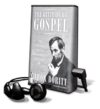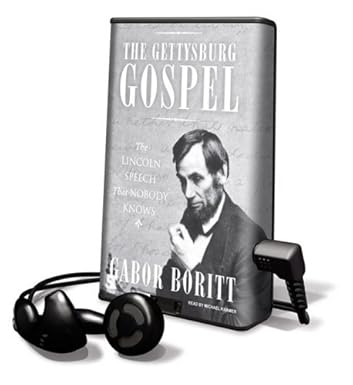
€58.40
The Gettysburg Gospel by Author’s Name Price comparison
The Gettysburg Gospel by Author’s Name Price History
The Gettysburg Gospel by Author’s Name Description
The Gettysburg Gospel: A Unique Perspective on a Historic Event
The Gettysburg Gospel by Author’s Name is more than just a book; it is a compelling narrative that encapsulates the spirit and history of one of America’s most pivotal battles. This engaging read not only provides historic details but also delves into the personal stories that shaped the battlefield. If you’re looking for “The Gettysburg Gospel price” or “The Gettysburg Gospel review,” you’ve come to the right place.
Key Features and Benefits of The Gettysburg Gospel
- Language: Available in English, making it accessible to a broad audience eager to learn about America’s historical events.
- ISBN Details: ISBN-10: 1605146714 and ISBN-13: 978-1605146713, allowing for easy identification and ordering.
- Compact Size: With dimensions of 4.5 x 1 x 7.75 inches, this lightweight book (5.6 ounces) is perfect for on-the-go reading.
- Engaging Narrative: The author weaves historical facts with personal accounts, providing readers with an immersive experience that is hard to put down.
Comprehensive Price Comparison
When searching for “The Gettysburg Gospel price,” you will discover competitive options across various online retailers. Prices fluctuate, so it’s vital to compare them before making a purchase. Our platform allows you to see real-time prices from multiple suppliers, ensuring you get the best deal. The recent 6-month price trend indicates that prices have stabilized but may vary during promotional periods and sales events, so keeping a watchful eye is beneficial.
Insights from the 6-Month Price History
The 6-month price history chart reveals notable fluctuations that can aid your buying decision. Over time, prices have dipped during holiday sales, making this an ideal gift for history enthusiasts. By examining these trends, readers can determine the optimal time to buy “The Gettysburg Gospel.”
Customer Reviews: What Readers Are Saying
The Gettysburg Gospel has been met with enthusiasm by history buffs and casual readers alike. Customer reviews highlight several positive elements, including:
- Engaging Writing Style: Many appreciate the author’s ability to bring historical figures to life, making learning about history enjoyable.
- Rich Detail: The author expertly combines facts with narratives, providing depth to the events at Gettysburg.
However, some reviews noted that while the book is gripping, the depth of detail might overwhelm readers new to the subject. Despite this, those familiar with American history found it insightful and thought-provoking.
Explore Unboxing and Review Videos
To deepen your understanding, check out various unboxing and review videos available online. These visual resources offer additional insights and reactions that can enhance your appreciation of “The Gettysburg Gospel.” Seeing the book in real-time and hearing first-hand reviews can help solidify your decision to purchase.
In summary, The Gettysburg Gospel by Author’s Name represents a valuable addition to any history lover’s library. With its engaging narrative, competitive pricing, and insightful reviews, it’s clear why this book has become a popular choice. The balance between historical accuracy and narrative flair sets it apart in the literary market.
Don’t miss your chance to explore this captivating title. Compare prices now and immerse yourself in the incredible stories of the Gettysburg battlefield!
The Gettysburg Gospel by Author’s Name Specification
Specification: The Gettysburg Gospel by Author’s Name
|
The Gettysburg Gospel by Author’s Name Reviews (6)
6 reviews for The Gettysburg Gospel by Author’s Name
Only logged in customers who have purchased this product may leave a review.








Judy T. Hewitt –
-iT GIVES A GOOD IMAGE OF what Abe Lincoln was thinking about as he was writing his speech for Gettysburg. It gives feeling from a variety of people who were in were in attendance.
It is surprising how long it took for Abe’s speech to become popular.
Paul –
After reading this book, I have a new appreciation of the Gettysburg Address.
While many people have an understanding of what Lincoln said, Gabor Boritt provides us a solid background on what Gettysburg went through after the battle. There was not adequate resources to care for the wounded, bury the dead, and dispose of the thousands of horses and mules that were killed in the battle. There was great courage displayed by many of the women of the town, and from outside of Gettysburg, but the first few days after the battle, Gettysburg was nothing more than a makeshift hospital. Every home had wounded; every church and public building converted to help the wounded, and doctors working at amputations until they had to be held up.
And, when Lincoln did come to the dedication on Nov 19 1863, the primary speaker was Edward Everett and it was his masterful oration that made the greatest impact on the audience and the press. Lincoln’s spoken words were not fully appreciated until decades after the event.
If you read a book and get nothing new out of it, you have wasted your time. That is not the case here. This book will give you a new insight on Lincoln and his words at Gettysburg that will live for centuries.
J. Copeland –
This puts so much in perspective regarding the Battle of Gettysburg and what motivated Abraham Lincoln to write the “few appropriate remarks” at the dedication of our first National Cemetery. Highly recommended.
Don –
Its hard to think that so many passed these great words over for so long. Gabor Boritt gets every peice of this day down to the smallest detail. If you really want to know about that day read this.
Konrei –
We all know—or think we know—the story of the Gettysburg Address; how Abraham Lincoln jotted a few words on the back of an envelope while on a train en route to dedicate the new military cemetery at Gettysburg; how he gave the speech and the crowd was moved to reverent silence; and how, ever after, the Gettysburg Address has been a mainstay of the secular religion that is the idea of America.
Except, as Gabor Boritt, the Director of the Civil War Institute at Gettysburg College shows us, that story is all wrong—no, not wrong; myth. And myths do not have to have happened in order to be true.
The hard core of that myth comes from a little book called THE PERFECT TRIBUTE by Mary Shipman Andrews, first published in 1906, and republished and reimagined as a stage play, a movie and a TV show many times since. Boritt does not even tell us this until near the end of his text; other parts of the Gettysburg story are more crucial and contributed to the writing of THE PERFECT TRIBUTE, but Andrews’ mythologizing has become the accepted history.
Even scholarly sources tend to focus on the magnitude of Lincoln’s Address: “Lincoln was preceded by a famous orator of the day who droned on for two hours. Nothing is remembered of what he said.” Occasionally, a source will identify the “famous orator” as Edward Everett, and change the “nothing” to “little,” but Boritt highlights the truth that in 1863 and for years, nay decades, thereafter, when the term “Gettysburg Address” was used, the term referred to Everett’s speech.
Everett’s speech was very well known. A pundit of his day, and a masterful public speaker, Everett did what was common at the time; he prepublished his speech in numerous newspapers and journals, and so people who were not at Gettysburg experienced the speech indirectly (more so than his live audience, because Everett edited his remarks on the podium). Boritt reproduces Everett’s speech in full in one of the numerous appendices to THE GETTYSBURG GOSPEL. At over 11,000 words, it is ponderous for a 21st Century audience, but it is just what a 19th Century audience would have expected and loved, full of allusions to Athenian democracy, a detailed (if glorified) version of the battle, and a paean to the honored dead who’d fallen on the field. (The other appendices analyze the different written versions of the Lincoln speech in scholarly detail, and comprise 50% of the entire book.)
Lincoln’s remarks were not prepublished. They ran to only 276 words. And though newspapers of the day published Everett’s remarks in full (often having a supplied printed copy to work with) far fewer papers published the President’s remarks, which were described as “rough and unpolished,” minimized as “a few suitable dedicatory remarks,” outright attacked in the Copperhead press and the South, since “In speaking of ‘a new birth of freedom’ the President proved he must have negro blood,” and absurdly misquoted: “The refinished work” (‘as in furniture?’ Boritt asks parenthetically) and “The dead will not remember what we say here.” You think? Indeed, Boritt shows us that public criticism of Lincoln was, if anything, uglier and less restrained than public criticism of any modern President, including Barack Obama.
The reality of Lincoln’s speech is that, as Professor Boritt shows us, it did not come to the fore until after the end of Reconstruction and after the systemic re-disenfranchisement of African-Americans through Jim Crow was accomplished at the end of the 19th Century. As “The Great Emancipator” faded from the (White) American consciousness, the “Gettysburg Lincoln” took his place. The scroll that Lincoln grasps or reads from in innumerable paintings and sculptures is often now identified as the Address, where it was originally identified (and usually meant to be) the Emancipation Proclamation. The effective erasure of the Proclamation became a part of the reunification process for the country. Not for nothing does the great Lincoln Memorial in Washington have carven in its walls the Gettysburg Address and the Second Inaugural, but it lacks the Proclamation, which affected millions of human beings immediately and forever.
But if it supplanted the idea of the Emancipator, the Gettysburg Address added immeasurably to the dignity in which the Office of the President is cloaked (if not always the men who fill that office). While Lincoln was invited to Gettysburg as an adjunct speaker to Everett, any President would now be the keynote speaker, and his words would be faithfully reported and thoroughly discussed. The iconic Lincoln who arose after Gettysburg (aided and abetted by his martyrdom at war’s end) redefined the Presidency forever as a magisterial office of great power, an office commanding a bully pulpit, and an office, which, when filled by flawed humans of good intent, can elevate both the man and the nation to greater things. In that sense, every President since Abraham Lincoln IS Abraham Lincoln.
carolyn sue corbett –
Abraham Lincoln is my husband’s favorite person. I bought the book as a gift for him. He said the book is wonderful and insightful.